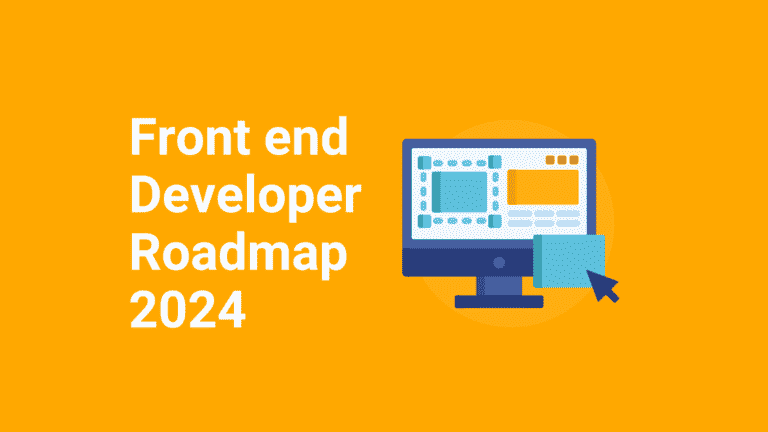The journey into front end development is similar to discovering a new world in which we design how websites and apps appear and function. It’s significant because it determines how people utilize and enjoy what they see on the internet. Read this Frontend developer roadmap guide to become front end developer in 2024.
Table of Contents
Introduction
This frontend developer roadmap serves as a handbook for anyone interested in becoming front end developers. It teaches students step-by-step what they need to learn and accomplish to become truly proficient. It’s like a road plan that guides them through all they need to know about front end development. This guide assists them in focusing and staying on track while they master all of the necessary abilities.
Essential Frontend Technologies
Internet
Understanding the web’s linked landscape is critical. Examine fundamental concepts such as domains, DNS, servers, and HTTP/HTTPS protocols. Learn how web browsers work and how they render web pages, which are the foundation of online interactions. This is the first step of frontend developer Roadmap.

HTML
HTML, or Hypertext Markup Language, serves as the foundation for all web content. Dive into its position as the web structure’s backbone, allowing developers to define elements, organize material hierarchically, and establish the core structure for webpages.
Visual Studio Code
Visual Studio Code (VSCode) is a dynamic tool in the world of code editors. Discover its powerful features, including as syntax highlighting, a large selection of extensions, and an integrated terminal. Its simple UI and customizable features enable developers to write code quickly.
CSS
CSS (Cascading Style Sheets) add visual appeal and aesthetic sophistication to web design. Learn about its capabilities in styling elements, designing layouts, and assuring responsive design for consistent user experiences across multiple devices.
JavaScript
JavaScript, the language of web interactivity, gives static web pages life. Investigate its features, which range from enabling dynamic content updates to developing complicated features that increase user engagement and involvement.
Prompt Engineering
By exploiting huge language models like ChatGPT, you can unlock the promise of rapid engineering. Discover ways for improving workflow efficiency and extracting appropriate solutions, hence improving the development process.
Version Control
Git is a version control system that allows for seamless tracking of changes and collaborative development. GitHub serves as a repository hosting platform, supporting collaboration, code sharing, and deployment.
Package Management
Package managers, such as npm or yarn, are essential for managing software libraries and dependencies. Streamline project development by ensuring that dependencies are in the correct version, ensuring project stability.
Design with Bootstrap 5 and SASS
Bootstrap 5 includes a plethora of pre-designed components that simplify UI development. SASS augments CSS with advanced styling approaches, variables, and nesting rules, upgrading the styling process.
JavaScript Frameworks
JavaScript frameworks such as React, Vue, and Angular make complex jobs easier by encouraging code reuse, scalability, and increased performance. These frameworks are used to construct powerful, dynamic, and interactive online applications.
Tailwind CSS for Flexibility
Tailwind CSS is a revolutionary utility-first approach to UI development, allowing for faster UI development. Designers may create bespoke designs with its wealth of utility classes, decreasing reliance on custom CSS and shortening development cycles.
JavaScript Testing
It is critical to ensure the dependability and functionality of online applications. Comprehensive testing is made possible by tools such as Jest and Cypress, which reduce bugs and provide excellent application quality.
TypeScript
TypeScript provides a methodical approach to JavaScript programming. Its type annotations, interfaces, and better tooling make it easier to write robust, error-resistant code, which improves overall code quality.
Prioritizing Web Security (OWASP)
OWASP’s recommendations and recommended practices for securing online applications are crucial. Understanding common vulnerabilities and associated mitigations is critical for protecting user data and application integrity.
GraphQL
GraphQL allows for greater flexibility in accessing complicated data structures, making it a viable alternative to traditional RESTful APIs. Its ability to request specific data cuts down on over-fetching, improving data retrieval efficiency.
Next.js
Next.js makes server-rendered React apps easier to use by providing capabilities such as automated code splitting and server-side rendering. This framework accelerates development while improving performance and developer experience.
Astro
Astro’s approach to producing quicker webpages includes defaulting to less JavaScript. Astro greatly decreases load times and ensures optimal performance by permitting partial hydration and integrating with new frameworks.
Best Practices
Image optimization, browser caching, and lowering server response times all have a substantial impact on website performance and user experience. Regular audits utilizing tools such as Google’s Lighthouse can provide insights and suggestions for improvement.
React Native
React Native allows for cross-platform mobile app development, allowing developers to create code once and release it on both the iOS and Android platforms. Its large component library and native modules ensure a natural and smooth user experience.

Conclusion
Front end development is still a vibrant and ever-changing field. Continuous learning, community participation, and experimentation with new tools and frameworks are critical. This roadmap is a starting point, but the path in frontend development is an ongoing investigation of new possibilities, providing limitless chances for designing amazing web experiences.


